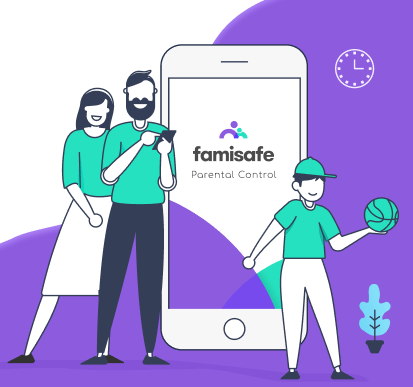Try FamiSafe, Protect kids' cyberlife.
FamiSafe lets parents control screen time, track real-time location and detect inappropriate content on kids' devices.
The internet has integrated into every aspect of our life. We cannot count many places where the world wide web hasn’t swept in from entertainment to education. This integration has been incredibly beneficial to both students and teachers, who can look towards the internet for valuable resources.

However, while staying connected brings several benefits, cyberbullying is also rising, and parents must know how to protect their kids adequately. Click here to learn more about how to protect kids' safety on the internet.
Part 1: STFU
STFU is considered one of the most used slang of all time. It stands for Shut The F**k Up, which is a not so polite way of expressing disagreement with someone. Obviously, this type of slang is often used offensively and is usually a depiction of rudeness.
Shutting off someone’s dialogue
One is when a person has to portray that the conversation won’t lead to a good end and should stop speaking at once. It is also used to completely disregard one’s dialogue where the listener doesn’t want to hear another word by the speaker.
In a friendly manner
If the relationship between two people is of a friendly nature, the abbreviation can also be used in a light-hearted manner, so it’s important to know what type of bond the conversers share before judging the meaning of the abbreviation.
Example: “Man, just STFU, you’ve been talking for hours!”
Extensions
STFO- Shut The F**k Off
SYFF- Shut Your F**king Face
Part 2: GTFO
GTFO, an abbreviation for ‘Get the Fuck Out,’ is another offensive word that bullies mostly use on social media sites or online forums. The word itself can be used in an insulting manner where one’s voice is refused to be heard and is ordered to leave.
Example: “If you can’t help keeping your mouth shut, then GTFO!”
However, many people use GTFO as a friendly gesture than offending someone, as demonstrated in the headings below.
Used in shock
GTFO can also be used when another person is surprised or astonished by a statement or a scenario. For example, a friend might tell a person a surprising scenario where he/she did an impossible feat. The person might respond with a ‘GTFO.’ This doesn’t necessarily mean the person is in disbelief but might only show emotions of amazement.
Example: “GTFO, you met Tom Cruise?”
Used in disbelief
Although the line is blurry here, they might also use GTFO if a person is not in shock and simply in utter disbelief. The abbreviation might also be used in an offensive manner where the person doesn’t only not agree with another person’s opinions but also wholly disregards them.
Example: “No one wants to hear your bullshit, just GTFO”
Used in memes
GTFO is also regularly used in meme formats. However, this usage is done in a lighter tone and doesn’t represent anything offensive most of the time.

Extensions
GTFOOMW - Get the fuck out of my way
GTFOHWTBS- Get the fuck out of here with that bullshit
Part 3: FYVM (FK you very much)

Another popular slang on social media is FYVM. It stands for “Fuck You Very Much,” mainly the bullies use it to add a sarcastic hint of ‘Thank you very much,’ in their conversation. This phrase is mainly used when someone needs to degrade others when a particular gift or action has been performed for them that they didn’t like.
When a sure thing is done that the other person doesn’t appreciate or thinks very little of, FYVM is used. Specific phrases can also be used in place of the abbreviation, such as ‘Thanks but no Thanks’ or ‘it was the least you could do for me.’ The abbreviation is also more commonly used in speaking discourse than writing. It is usually referred to as a drag or pride term.
Example: “FYVM for the umbrella you have brought as the rain has already messed up my dress.” Most people also use FYVM differently under certain circumstances.
Used in frustration
FYVM is often used among people in return for a statement or an action they’ve seen or observed.
Example: “FYVM for ruining over a month’s progress in a single day!”
Used in memes
Not always in a rude way, sometimes this phrase is used by people on a lighter note when making memes on social media.
Example: “Me when they killed Bambi: FYVM.”
Part 4: Should Parents be Aware of Bad languages?

As already discussed above, it’s almost impossible for parents to stop their children from being exposed to the internet. Moreover, readily accessible technology has made sure of that. However, parents can learn their abbreviations and how they are used to knowing if their child is being bullied online or is just having a fun conversation.
At first, it might not look easy to understand what teenagers are talking about as conversation standards have changed a lot in the past 10 years. However, by investing time in learning these abbreviations, parents can understand and protect their children from the effects of cyberbullying. Below is a list of steps parents should follow to keep their children far from potential danger.
Step 1 - Look up the abbreviation’s full form
Look for the unknown abbreviation online, and learn its complete form.
Step 2 - Search, for example, sentences
It’s important to know that the entire form is not enough to understand the meaning of the abbreviation since some words. Although however, they might seem offensive, their usage might be light-hearted. So to understand the slang word’s meaning, one must see how it’s used in sentences and whether the overall context is offensive.
Step 3 - Help your child if cyberbullying is observed
Suppose it’s confirmed that cyberbullying is indeed taking place. In that case, the first thing to do is remain calm and keep an open communication channel with the child. Help the child understand what kind of behavior he or she should deem acceptable and what type of behavior they should stay away from.
Check this video explaining the cyber risks.
Try FamiSafe, Know kids' whereabouts.
Step 4 - Be aware of the time your child spends online
This part, of course, varies from age to age. Still, if the child is on the younger side of the spectrum, it must be made sure he/she is not increasingly or emotionally preoccupied with his/her device. This is because if there is an emotional attachment, the child will ignore signs of cyberbullying. After all, it might restrict his/her access to staying online.
Part 5: What’s the best way to monitor kids’ text?

Although the internet is filled with unlimited options for parental control, not all of them can be trusted with a sense of reliability. Wondershare FamiSafe is known and approved by millions of parents worldwide for letting control over your child’s phone. In addition, it has an easy interface for most non-techy parents to avoid getting lost in the technicalities.
Moreover, it allows the parents to keep track of their child’s current location, detect inappropriate action or content on social media, and limit the screen time on the devices used by children.
• Get Away from Online Danger
The internet and different social media apps have no bounds for cyberbullying or even sexual predators. FamiSafe notifies you when your child comes across any offensive word or content through videos or texts.
• Block messages from a specific person or number
If the child is a minor, the parents will not want him/her to talk with suspicious strangers through messages.
Wondershare Famisafe
FamiSafe lets parents control screen time, track real-time location and detect inappropriate content on kids' devices.

Conclusion
Friendly banter can come in various forms. For example, you can call each other different names in the form of slang words, and nobody gets offended. Instead, it generally makes the online gaming and chatting experience wholesome.
However, the trouble occurs when an individual throws profanities at you to cause harm and offense. In that case, usage of specific slang words falls under cyberbullying. After reading this post, now you understand what slang phrases account for cyberbullying. Moreover, with Wondershare FamiSafe, you can keep your child safe from any cyberbullying attempts.
